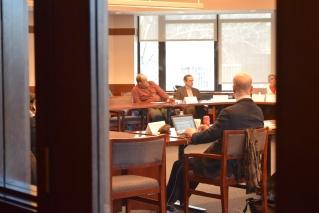By Theresa Schliep

The Faculty Senate is attempting to resolve matters is internally through filing grievances. (Andrea Garcia/The Fordham Ram)
The Faculty Senate at Fordham University filed grievances with four administrative members and groups, including Rev. Joseph M. McShane, S.J., president of the university, after the university imposed an unapproved salary raise, which the Faculty Senate says violated the university’s own statues.
The three other people and groups mentioned in the grievances were Martha Hirst, senior vice president, chief financial officer, Treasurer Dr. Stephen Freedman, university provost and members of the Fordham University Board of Trustees. The Senate sent their grievances to the Faculty Hearing Committee.
Bob Howe, director of communications at the university, responded for the four aforementioned parties when The Fordham Ram requested comment. Howe said the university is not issuing a statement on the matter, instead focusing on “productive discussions about the 2018 budget and compensation.”
Faculty Senators believe that the filing of grievances should allow for resolution between the parties involved.
“The grievance process should give everyone an opportunity to review the various complaints in a careful and considered manner,” said Professor Henry Schwalbenberg in an email interview with The Fordham Ram. “That will hopefully lead to a mutually agreeable resolution that will prevent further escalation.”
Professor Andrew Clark of the Faculty Senate said the nature of these grievances is unique both in its rarity and in nature.
“Grievances are filed all the time, but this doesn’t mean this type of grievance with these individuals is,” said Clark. “In my memory, the Senate has never filed against the president of the university. It is rather significant and unique from that point of view.”
The aforementioned Hearing Committee is a committee comprised of nine tenured faculty members appointed by the Faculty Senate.
Clark said the committee is the “internal justice system of the institution.” Any grievances filed by members of the university committee are heard by the Hearing Committee.
“The Hearing Committee deals with any grievance put before them,” he said.
Clark said these grievances can range from sexual harassment and racism, to faculty members feeling that they have been unjustly passed over for a position.
Anne Fernald, president of the faculty senate, said the Hearing Committee uses discretion to come to its determination. The committee’s decision is “ordinarily determinative,” she said.
Fernald said the committee has the right to ask for any and all additional information necessary to come to a conclusion regarding the grievances. This includes law scholars and legal advice.
The timeline for filing grievances is not determinable, said Fernald.
Both Clark and Fernald said the Faculty Senate is attempting to resolve matters internally, before resorting to external assistance.
“We are trying to deal with the process internally first and depending on what transpires, we will potentially file a grievance with the AAUP or a lawsuit,” said Clark.
Fernald repeated this idea, saying, “in light of the current violation of the statues, the best first thing for us to do is to try and solve the problem internally before going external.”
Fernald said that while the Faculty Senate is frustrated, they are measuring their responses carefully.
“We are trying to take our response one step at a time,” said Fernald.
University Statute §4-06.08 dictates that the Faculty Hearing Committee handles matters related to §4-07, Parts II, III and IV.
Fernald said it is her responsibility to charge the committee with their rules and procedures. From there, her involvement in the committee concludes.
The Faculty Senate responded with the grievances. Some faculty regard their move as an attempt to maintain the university’s responsibilities.
“Governance, governance, governance,” said Dr. Grace Vernon, professor of biology at Fordham University Lincoln Center. “We have issues here, but the bottom line is governance. We need to protect the integrity of the institution.”
